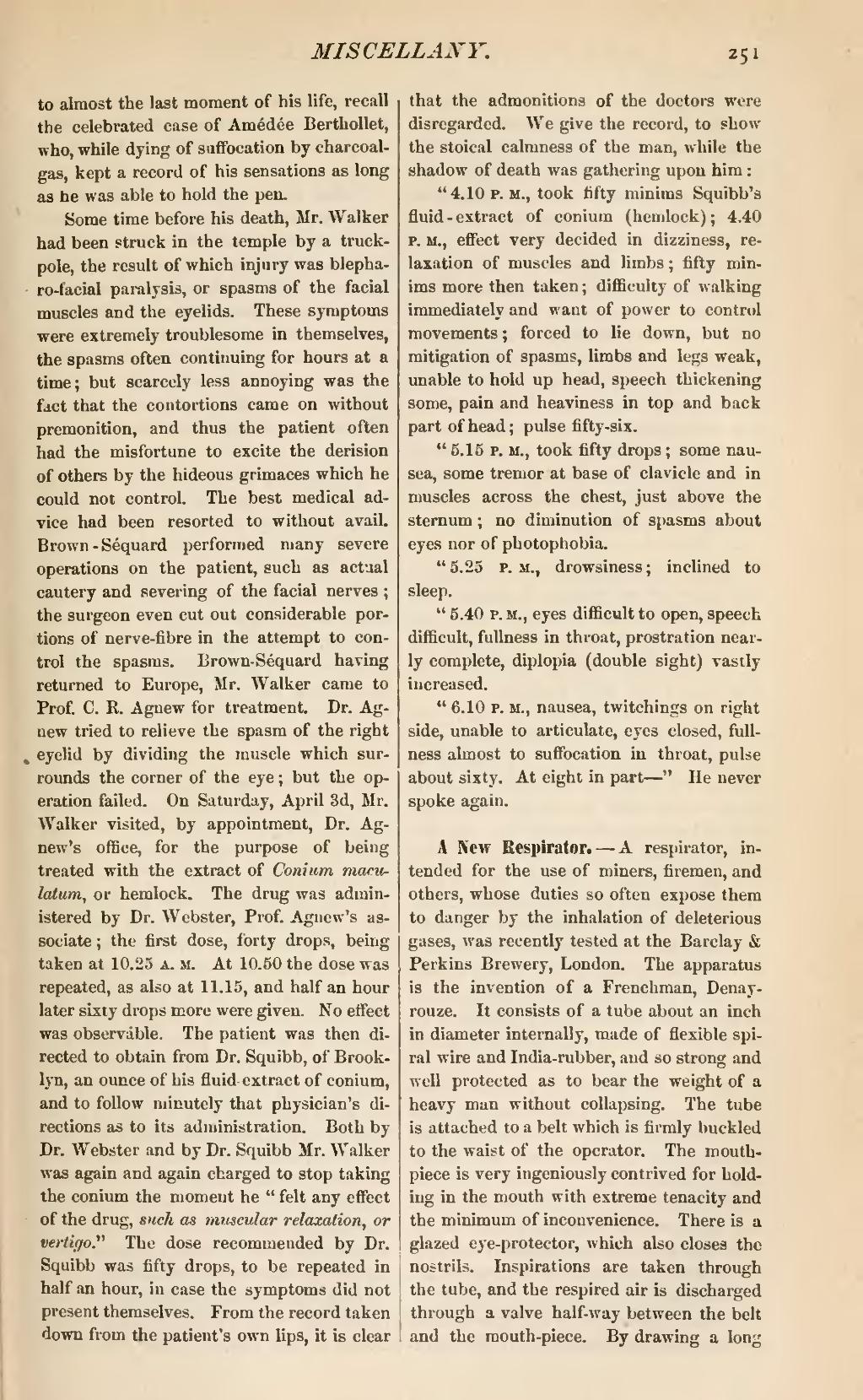to almost the last moment of his life, recall the celebrated case of Amédée Berthollet, who, while dying of suffocation by charcoal-gas, kept a record of his sensations as long as he was able to hold the pen.
Some time before his death, Mr. Walker had been struck in the temple by a truck-pole, the result of which injury was blepharo-facial paralysis, or spasms of the facial muscles and the eyelids. These symptoms were extremely troublesome in themselves, the spasms often continuing for hours at a time; but scarcely less annoying was the fact that the contortions came on without premonition, and thus the patient often had the misfortune to excite the derision of others by the hideous grimaces which he could not control. The best medical advice had been resorted to without avail. Brown-Séquard performed many severe operations on the patient, such as actual cautery and severing of the facial nerves; the surgeon even cut out considerable portions of nerve-fibre in the attempt to control the spasms. Brown-Séquard having returned to Europe, Mr. Walker came to Prof. C. R. Agnew for treatment. Dr. Agnew tried to relieve the spasm of the right eyelid by dividing the muscle which surrounds the corner of the eye; but the operation failed. On Saturday, April 3d, Mr. Walker visited, by appointment. Dr. Agnew's office, for the purpose of being treated with the extract of Conium maculatum, or hemlock. The drug was administered by Dr. Webster, Prof. Agnew's associate; the first dose, forty drops, being taken at 10.25 a. m. At 10.50 the dose was repeated, as also at 11.15, and half an hour later sixty drops more were given. No effect was observable. The patient was then directed to obtain from Dr. Squibb, of Brooklyn, an ounce of his fluid-extract of conium, and to follow minutely that physician's directions as to its administration. Both by Dr. Webster and by Dr. Squibb Mr. Walker was again and again charged to stop taking the conium the moment he "felt any effect of the drug, such as muscular relaxation, or vertigo." The dose recommended by Dr. Squibb was fifty drops, to be repeated in half an hour, in case the symptoms did not present themselves. From the record taken down from the patient's own lips, it is clear that the admonitions of the doctors were disregarded. We give the record, to show the stoical calmness of the man, while the shadow of death was gathering upon him:
"4.10 p. m., took fifty minims Squibb's fluid-extract of conium (hemlock); 4.40 p. m., effect very decided in dizziness, relaxation of muscles and limbs; fifty minims more then taken; difficulty of walking immediately and want of power to control movements; forced to lie down, but no mitigation of spasms, limbs and legs weak, unable to hold up head, speech thickening some, pain and heaviness in top and back part of head; pulse fifty-six.
"5.15 p. m., took fifty drops; some nausea, some tremor at base of clavicle and in muscles across the chest, just above the sternum; no diminution of spasms about eyes nor of photophobia.
"5.25 p. m., drowsiness; inclined to sleep.
"5.40 p. m., eyes difficult to open, speech difficult, fullness in throat, prostration nearly complete, diplopia (double sight) vastly increased.
"6.10 p. m., nausea, twitchings on right side, unable to articulate, eyes closed, fullness almost to suffocation in throat, pulse about sixty. At eight in part—"He never spoke again.
A New Respirator.—A respirator, intended for the use of miners, firemen, and others, whose duties so often expose them to danger by the inhalation of deleterious gases, was recently tested at the Barclay & Perkins Brewery, London. The apparatus is the invention of a Frenchman, Denayrouze. It consists of a tube about an inch in diameter internally, made of flexible spiral wire and India-rubber, and so strong and well protected as to bear the weight of a heavy man without collapsing. The tube is attached to a belt which is firmly buckled to the waist of the operator. The mouthpiece is very ingeniously contrived for holding in the mouth with extreme tenacity and the minimum of inconvenience. There is a glazed eye-protector, which also closes the nostrils. Inspirations are taken through the tube, and the respired air is discharged through a valve half-way between the belt and the mouth-piece. By drawing a long

